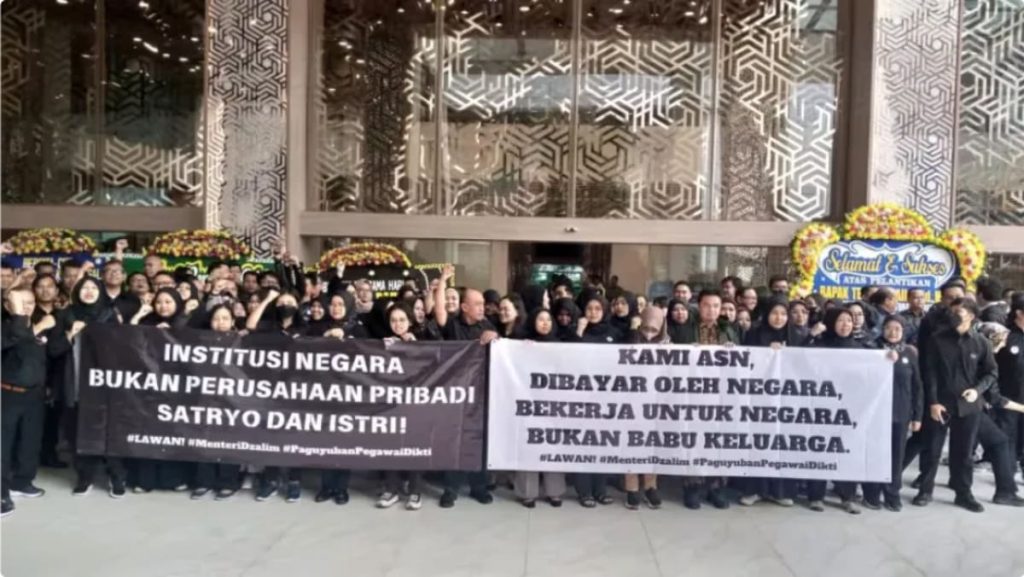The Indonesian Ministry of Higher Education, Science, and Technology found itself embroiled in controversy in January 2020, following allegations of employee mistreatment and unfair dismissals against Minister Satryo Soemantri Brodjonegoro. Hundreds of civil servants staged a protest outside the ministry’s office in Central Jakarta, expressing their discontent with the minister’s handling of employee rotations and voicing concerns about alleged verbal abuse and dismissals without due process. The demonstrations were sparked by a series of events, including the abrupt dismissal of a staff member reportedly over a minor incident involving office furniture. Adding fuel to the fire, a voice recording circulated online, purportedly capturing Satryo verbally berating and physically assaulting a vendor over a water issue at his residence. The protesting civil servants displayed banners accusing Satryo of treating the ministry as a personal fiefdom and calling upon President Prabowo Subianto to intervene and protect them from the minister’s alleged wrath.
Satryo vehemently denied the accusations leveled against him, dismissing the voice recording as a fabrication and asserting that it was not his voice. He attributed the widespread reshuffling within the ministry to the need for increased efficiency and improved work synergy, emphasizing his commitment to fostering a positive and fulfilling career path for his staff. He explained that the restructuring was a direct response to President Subianto’s call for greater budgetary efficiency, following the division of the former Ministry of Education and Cultural Affairs into three separate entities: the Ministry of Primary and Secondary Education, the Ministry of Higher Education, Science, and Technology, and the Ministry of Cultural Affairs. Satryo met with the protesting civil servants, reiterating his commitment to implementing the president’s directives and explaining the necessity of such rotations within any organization. He maintained that the changes were essential for streamlining operations and aligning with the president’s vision for a more fiscally responsible government.
The protests highlighted the underlying tensions and anxieties surrounding the restructuring of the education ministry. The division of the ministry into three separate entities inevitably led to significant personnel changes and realignments, creating uncertainty and apprehension among the staff. The allegations of abusive behavior and unfair dismissals further exacerbated these concerns, creating a climate of distrust and resentment towards the minister. The protesting civil servants felt their concerns were being disregarded and their livelihoods threatened by arbitrary decisions. The banners displayed during the protest, accusing Satryo of treating the ministry as his personal domain and referring to employees as “slaves,” underscore the depth of their resentment and their perception of being unjustly treated.
The incident also brought to the fore the delicate balance between the need for organizational restructuring and the importance of ensuring fair treatment and due process for employees. While organizational changes are often necessary for improving efficiency and achieving strategic goals, they must be implemented in a manner that respects the rights and dignity of the workforce. The allegations against Satryo, if proven true, would represent a serious breach of trust and a violation of ethical leadership principles. The public outcry and the protests by civil servants underscored the importance of transparency, accountability, and ethical conduct within government institutions. The incident served as a reminder that leadership positions come with a responsibility to treat employees with respect and fairness, and that any perceived abuse of power can have serious repercussions.
The controversy surrounding Satryo and the Ministry of Higher Education, Science, and Technology raised broader questions about the management of civil servants in Indonesia. The protests highlighted the vulnerability of civil servants to arbitrary decisions and the need for stronger protections against unfair treatment. The incident also underscored the importance of effective communication and engagement with employees during periods of organizational change. The lack of clear communication and consultation with staff regarding the restructuring may have contributed to the sense of unease and resentment that ultimately led to the protests. The incident served as a valuable lesson in the importance of fostering a positive and supportive work environment, where employees feel valued and respected.
The allegations against Satryo, while denied by the minister himself, underscored the need for thorough investigations into such claims and the importance of holding government officials accountable for their actions. The incident highlighted the role of the media and civil society in bringing such issues to light and demanding transparency and accountability from those in positions of power. The protests by civil servants demonstrated the power of collective action in voicing concerns and demanding change. The incident served as a reminder that a healthy democracy requires an engaged citizenry willing to hold its leaders accountable and demand ethical conduct in all spheres of government. The long-term impact of this controversy will likely depend on how the government responds to the concerns raised by the protesting civil servants and whether effective measures are taken to address the underlying issues of employee treatment and organizational management within the ministry.

